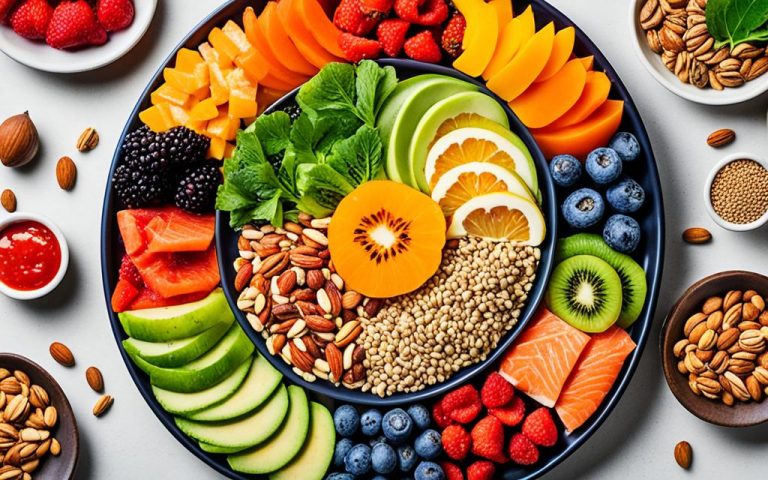Insulin Resistance – Recognition and Management Tips
Learning about insulin resistance is key to keeping your health in check. It’s influenced by both genetics and lifestyle. This issue can turn into metabolic syndrome, upping your chances of getting diabetes and heart disease.
To get ahead of this, look out for signs like feeling tired or having high blood sugar. Then, you can make changes to your diet, exercise more, and get medical help if needed. Also, working on being more sensitive to insulin and keeping an eye on your health are crucial parts of managing this condition.
Key Takeaways
- Knowing the signs of insulin resistance is the first step in dealing with it.
- A healthy diet focused on managing insulin resistance can make a big difference.
- Staying physically active is key to fighting the negative effects of insulin resistance.
- Sometimes, you might need help from doctors, like with insulin sensitizers, for better control.
- Changing your habits and staying on top of your health can go a long way in managing things well.
Understanding Insulin Resistance and Its Impacts on Health
To get how insulin resistance affects us, we need to know what it is. And how it connects with metabolic syndrome, affecting our health. Let’s dive into the key points that show how this all works.
What Is Insulin Resistance?
Insulin resistance happens when your cells don’t use insulin well. Insulin is key for controlling blood sugar. When your cells don’t respond right, your blood sugar levels go up. This can cause many health problems over time.
How Insulin Resistance Affects Your Body
Insulin resistance doesn’t just impact one part of your body. It can cause you to feel tired all the time, increase your blood pressure, and can even lead to type 2 diabetes or heart disease.
The Connection Between Insulin Resistance and Metabolic Syndrome
Metabolic syndrome raises the risk of heart disease, stroke, and diabetes. It often starts with insulin resistance. Linking these together is essential for lowering the health dangers they bring.
Understanding the many effects of insulin resistance helps you handle health challenges better. This knowledge can lead to a healthier life.
Recognizing the Symptoms of Insulin Resistance
Knowing the insulin resistance symptoms early is key. It helps you control and treat it fast. This also gives you the power to start taking steps towards better health.
Common Signs to Watch For
Insulin resistance warning signs are often overlooked. It’s important to pay attention to how your body feels. This way, you can spot the signs early.
Here are some signs you might notice:
- Frequent fatigue, even after a good night’s sleep
- Unusual cravings for sweets and carbohydrates
- Difficulty losing weight despite active efforts
- High waist circumference compared to hip circumference
- Darker skin patches, especially around neck and elbows (a condition known as acanthosis nigricans)
When to Seek Medical Advice
Seeing any of these insulin resistance warning signs means you should see a doctor. It’s important to know when to see a doctor for insulin resistance. If symptoms get worse or stay, consulting a healthcare provider is wise.
Doctors can do tests to diagnose and suggest the best ways to manage it. Early action and talking to a doctor can make a big difference. It helps prevent serious conditions like type 2 diabetes and heart problems.
Lifestyle Changes to Counteract Insulin Resistance
Taking steps to deal with insulin resistance means looking at your whole life, not just taking medicine. It’s about making lifestyle changes that stick. Doing this every day can boost how well your body responds to insulin and your health overall.
One of the first steps is to keep a healthy weight. Carrying too much weight, especially around your belly, makes insulin not work as well. Losing even a little weight, like 5 to 10%, can make a big difference in how well your body uses insulin.
Getting moving helps a lot, too. a mix of exercises like walking or running, and strength training can really improve your body’s insulin sensitivity.
It’s also important to keep stress low and get enough sleep. Both high stress and not sleeping well can mess with your hormones and make it harder for your body to use insulin right.
- Maintain a healthy weight: A critical factor in fighting insulin resistance.
- Engage in physical activity: Mix up your exercise and keep moving.
- Manage stress effectively: Try things like yoga or meditation.
- Ensure sufficient sleep: Strive for 7 to 9 hours of rest each night.
These changes lay a strong base for better health and insulin sensitivity by tackling insulin resistance head-on.
| Aspect | Recommendation | Benefit |
|---|---|---|
| Physical Activity | Try to move for 30 minutes most days | It helps your body use insulin better |
| Weight Management | Keep your body mass index in a healthy range | Lessens how resistant your body is to insulin |
| Stress Management | Make time for regular meditation or yoga | Less stress means less spikes in your blood sugar |
| Sleep | Aim to sleep 7-9 hours every night | It keeps your hormones in check |
Nutritional Strategies for Improving Insulin Sensitivity
Changing your diet helps handle insulin resistance and makes your body more sensitive to insulin. Knowing what to eat and what to skip makes a big difference in how you fight this health issue.
The Role of Diet in Managing Insulin Resistance
Eating the right foods is key in regulating blood sugar and making insulin work better. A smart diet can stop insulin resistance from getting worse and even turn it around. This boosts your metabolism and helps you stay healthy.
Foods to Include for Better Insulin Management
- Go for whole grains like quinoa and oats for long-lasting energy.
- Eat lots of leafy greens like spinach to help your body use insulin better.
- Get your protein from plant sources such as lentils and tofu to keep your sugar levels steady.
- Enjoy fatty fish like salmon to fight inflammation and improve your cholesterol.
Foods to Avoid to Reduce Insulin Resistance
- Say no to processed meats and fatty animal products that make insulin issues worse.
- Avoid white bread, pastries, and sugary snacks as they quickly raise blood sugar.
- Don’t drink sugary beverages or eat too many desserts. They don’t help your health and mess with your insulin.

Make these diet changes part of your everyday life to effectively fight insulin resistance. By choosing foods that are good for insulin management and steering clear of bad choices, you can better your insulin sensitivity. It’s important to stick with these habits to see lasting improvements in your health.
Physical Activity: A Key Component in Insulin Resistance Management
As part of managing insulin resistance, using physical activity is key. Exercise helps make insulin work better. This link shows exercise’s benefits for insulin resistance are major.
Moving more boosts how well your insulin works. This means your body can better handle sugar, lowering blood sugar levels. Doing activities like walking, biking, or taking group classes is good. Just keep at it to see the benefits.
- Start with moderate exercise, aiming for at least 150 minutes per week.
- Incorporate both aerobic activities and strength training to maximize insulin sensitivity.
- Set realistic goals and gradually increase the intensity and duration of your workouts.
Staying active does more than just lower your blood sugar. It helps with weight control, lower blood pressure, and a healthier heart. This all helps in managing insulin resistance well.
| Activity Type | Frequency | Benefits |
|---|---|---|
| Aerobic Exercise | 3-5 times a week | Improves heart health, enhances insulin sensitivity, lowers blood pressure |
| Strength Training | 2-3 times a week | Increases muscle mass, boosts metabolism, improves glucose management |
| Flexibility and Stretching | Daily | Enhances muscle function, reduces injury risk, improves overall physical performance |
Make exercise a regular part of your life to fight insulin resistance. Every step you take boosts your health and helps control your blood sugar. This shows the big benefits of exercise for insulin resistance.
Medical Interventions and Insulin Resistance Treatment Options
Treating insulin resistance means looking at both medicines and lifestyle changes. There have been big steps in medicine for this, giving hope for better treatment.
Pharmacological Approaches to Managing Insulin Resistance
Certain drugs called insulin sensitizers play a big role in treating insulin resistance. They help the body respond better to insulin. This lowers blood sugar levels without needing more insulin. Metformin and thiazolidinediones are two examples used a lot. They offer a way to help manage this metabolic issue.
Making Informed Decisions About Insulin Sensitizers
Finding the best medication for insulin resistance means knowing their benefits and side effects. It’s crucial to work with healthcare providers to pick the right treatment plan for you.
| Medication | Type | Common Usage | Potential Side Effects |
|---|---|---|---|
| Metformin | Biguanide | First-line treatment for type 2 diabetes | Gastrointestinal upset |
| Pioglitazone | Thiazolidinedione | Improves insulin sensitivity | Weight gain, risk of heart failure |
| Rosiglitazone | Thiazolidinedione | Reduces blood glucose levels | Increased risk of cardiovascular events |
“Insulin resistance – recognition and management”: A Comprehensive Overview
Looking to understand insulin resistance better? And want to know its symptoms and how to manage it? If so, this guide is perfect for you. Insulin resistance makes your body’s cells not respond well to insulin. It’s important to get a handle on this issue to avoid health problems.
This guide gives you all the info you need about insulin resistance. So you can manage it well and stay healthy. Let’s start by exploring what insulin resistance is and how you can deal with it.
Insulin resistance might not show obvious signs at first. But knowing what to look for will help you get help early. Understanding insulin resistance lets you make lifestyle changes. These changes can support any medical treatments you receive.
The strategy is to recognize and manage the condition. This prevents more serious health issues like type 2 diabetes. Plus, it’s important to keep tabs on how you’re doing and adjust your treatment as needed.
Understanding your body’s response to insulin is the first step in managing insulin resistance efficiently.
- Early recognition of symptoms like increased thirst, fatigue, and frequent infections
- Importance of regular monitoring of blood sugar levels
- Lifestyle changes such as regular physical activity and balanced diet
Learning to spot early signs of insulin resistance is crucial. This guide gives you the knowledge to take charge of your health. By mixing what you know with real actions, you can beat insulin resistance. Remember, staying informed and acting early are keys to good health.
| Aspect | Importance | Recommendations |
|---|---|---|
| Lifestyle Changes | High | Regular exercise, dietary adjustments |
| Monitoring | Critical | Frequent glucose testing, health check-ups |
| Medical Intervention | As needed | Consultation with healthcare providers, possible medication |
The insulin resistance guide helps you spot and manage this condition. It’s all about knowing the theory and acting on it. Use this guide to be informed and actively fight back. Complete information and early steps are how you stay healthy.
Addressing Insulin Resistance Through Behavior Modification
Trying to get healthier when you have insulin resistance can be tough. This part looks into ways to change your behavior. These methods focus on staying with changes over time and not giving up.
The Importance of Consistency and Persistence
Long-term changes in how you live must be steady and ongoing. This is very important for handling insulin resistance. Acting the same way, or even better, over and over helps you fight insulin resistance. The goal isn’t a big switch suddenly. It’s about making easy changes that last.
Behavioral Techniques to Support Lifestyle Changes
There are many tricks to help you keep up new habits critical for insulin resistance. Here’s how to start:
- Set clear and achievable goals: Start with small, realistic goals that lead to significant health improvements.
- Self-monitoring: Track your progress through a food diary, activity log, or health checks. It shows how well you’re doing with insulin resistance and helps spot what to fix.
- Social support: Tell your friends and family what you’re trying to do. Or, join a group where you can all talk about the challenges and wins of our insulin resistance journeys.
- Reward system: Set up a way to celebrate when you meet a goal. Rewards keep you wanting to be healthy.
If you truly invest in behavior changes for insulin resistance, you can make a lifestyle focused on health. Don’t forget, this journey is a marathon, not a sprint. It takes time, effort, and a firm will to get healthy and stay there.
Monitoring and Adjusting Your Insulin Resistance Plan
Managing your insulin resistance well means always keeping an eye on how you’re doing. It’s about using regular checks to see what helps you and what doesn’t. This helps you tweak your plan for better results.
Tools for Tracking Your Progress
Digital tools and apps are great for keeping track of your health with insulin resistance. They look at things like how high your blood sugar is, what you eat, and how much you move. This gives you a good look at your health trends and how you’re doing.
Knowing When to Adapt Your Strategy
When the data from these tools shows things aren’t working, it’s time to change your plan. If you don’t see the progress you expected, talking with your doctor about switching things up is a good idea. They can help you find new ways to improve your strategy.
| Metrics | Baseline | 3 Months | 6 Months | Adjustment Needed |
|---|---|---|---|---|
| Blood Sugar Levels | 150 mg/dL | 140 mg/dL | 130 mg/dL | No |
| Daily Physical Activity | 3000 steps | 5000 steps | 4500 steps | Yes |
| Dietary Fiber Intake | 15g | 25g | 18g | Yes |
Checking and adjusting are key to managing insulin resistance well. Tell your healthcare team about any changes you make to get the best care. This way, they can work with you on a health plan that is right for you.
Conclusion
As we end, let’s remember the summary of insulin resistance management and recognition tips we talked about. It’s shown us that to beat insulin resistance, you need to look at your diet and start moving more. We’ve looked at many ways to increase insulin sensitivity and handle insulin resistance well.
In the different parts we read, we’ve seen final thoughts on insulin resistance. It’s important to act early and understand what causes this condition. Making smart choices in diet and lifestyle is key to dealing with it. Starting today, you can make choices that lead to a healthier life.
To finish, the insulin resistance conclusion reminds us to keep learning and find what works best for us. Remember, your journey in fighting insulin resistance is unique. Focus on what brings you lasting health, not just quick fixes.
FAQ – insulin resistance – recognition and management
What is insulin resistance?
Insulin resistance is when your body’s cells don’t react well to insulin. This makes blood glucose levels higher. Over time, this can cause metabolic syndrome, type 2 diabetes, and heart problems.
How does insulin resistance affect your body?
It makes it hard for your body to control blood sugar, leading to high levels. This can increase the risk of diabetes, cause weight gain, and make you tired. It also can lead to metabolic syndrome and its heart risks.
What is the connection between insulin resistance and metabolic syndrome?
Insulin resistance is a big part of metabolic syndrome. Apart from being hard to diagnose, it includes high blood pressure and other symptoms. Insulin problems are both a sign and a cause of this syndrome.
What are the common signs to watch for in insulin resistance?
Look out for feeling hungry all the time, needing to pee a lot, and gaining weight. You might also find it hard to lose weight. Feeling very tired, especially after meals, is another sign.
Also, notice any dark patches on your skin. These signs can be easy to miss, so stay aware of your body changes.
When should I seek medical advice for insulin resistance?
If you notice insulin resistance signs or worry about risks, see a doctor. They can check your insulin levels and advise based on your health. It’s smart to get help early. This can prevent serious diseases like diabetes.
What lifestyle changes can help counteract insulin resistance?
Making healthy life choices is key to fighting insulin resistance. This includes staying at a healthy weight and being active. Handle stress well, get enough sleep, and avoid smoking and too much alcohol. These changes boost your sensitivity to insulin and keep risks low.
What is the role of diet in managing insulin resistance?
Diet is crucial for beating insulin resistance. Focus on foods that keep your blood sugar steady. Eat whole grains, lean proteins, good fats, and lots of produce. Steer clear of sweets and processed food.
What foods should I include in my diet for better insulin management?
To handle insulin better, eat high-fiber foods and low-fat proteins. Include foods rich in healthy fats and antioxidants. Think beans, vegetables, whole grains, fish, and colorful fruits and veggies.
What foods should I avoid to reduce insulin resistance?
Avoid high-sugar items, white flour products, and processed meats. Say no to too much saturated and trans fats. These foods can spike your sugar and worsen insulin resistance. Stick to whole, nutritious foods.
Why is physical activity important for managing insulin resistance?
Exercise is vital for controlling insulin resistance. It makes your body’s insulin work better. This helps keep your blood sugar stable. Both cardio and strength activities are good for you.
What are the medical interventions and treatment options for insulin resistance?
Doctors may give you medicines that improve how your body reacts to insulin. It’s important to take these as directed, along with lifestyle changes. Always follow the advice of your healthcare provider for the best care.
How can behavior modification address insulin resistance?
Changing your habits is key to overcoming insulin resistance. Stick to a healthy eating and exercise plan. Setting goals and tracking your progress can help. A positive mindset and consistent effort are essential.
How can I monitor and adjust my insulin resistance plan?
Regular check-ups and tracking your blood sugar are crucial. Use tools like apps and glucose meters to stay on top of things. Always talk to your doctor about your plan. They can help you tweak it as needed for the best results.







